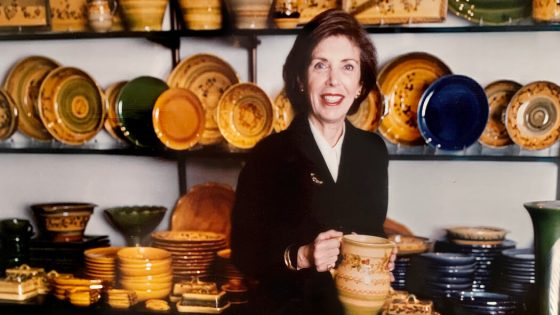Phyllis Pressman, the matriarch of the family that founded Barneys New York, the discount men’s wear store turned luxury emporium — and the creator of Chelsea Passage, the store’s home goods bazaar, a pivot point in its evolution from a suit merchant to an elite lifestyle behemoth — died on Tuesday in Palm Beach, Fla. She was 95.
Her death, in a hospice facility, was announced by her son Gene Pressman.
Barneys was always a family affair. It was named for Barney Pressman, who in 1923 pawned his wife’s ring, at her encouragement, for $500 to buy the lease of a small store on Seventh Avenue and 17th Street in Manhattan. There, he built an empire selling brand-name suits at cut-rate prices. His son, Fred, who took over in the 1950s, transformed the place into an haute men’s retailer that included European designers.
Phyllis Pressman, who was married to Fred, began working in the store so she could spend more time with him. Her first intervention was to style the windows, which she thought were boring, adding mannequins and whimsical objects like papier-mâché dogs. Then she began gussying up the interior of the store with antiques, jewelry and housewares, as well as the objects and textiles she found on her travels to the Marché aux Puces in Paris and Portobello Road in London.
In the late 1970s, Fred Pressman covered an alley abutting their property on the 17th Street side with a skylight and turned it over to his wife to fill with home goods. They named it the Chelsea Passage.
Ms. Pressman’s eye was impeccable, and her tastes were catholic. She carried the surrealist decorative objects of the Italian designer Piero Fornasetti and pieces by the English Art Deco ceramist Clarice Cliff. There were teapots sprouting roses by Mary Rose Young, as well as hand-painted throw pillows, twig place mats and antique jewelry. She sold flatware, stemware and linens, setting the pieces out on antique furniture — marble topped butcher tables, rattan settees, Art Deco bars — which, because customers asked, she began to sell too. She sold Li-Lac chocolates in display cases designed by a young Peter Marino.
As Chelsea Passage grew, so did Barneys. Fred Pressman’s sons, Gene and Robert, transformed the place as their father once had, overseeing the creation in the mid-1980s of a women’s store with interiors designed by Mr. Marino, Andrée Putman, Jean-Paul Beaujard and others.
Chelsea Passage filled the entire first floor like an enticing souk.
Ms. Pressman searched for unique handmade items and worked with artisans to create pieces to her specifications, tweaking the blade of a knife or the height and shape of a glass. She had costume-jewelry designers make napkin rings. She was the first to sell works by the exuberant designer Jonathan Adler, who was teaching pottery at night, and turned him into a full-time production potter with her orders. “I wouldn’t exist without her,” Mr. Adler said by phone.
She was firm about exclusives. If artisans began selling elsewhere, she would drop them from Chelsea Passage.
She was exacting and demanding — a perfectionist and a completist — recalled Lisa Barr, who was hired as a clerk and went on to become senior vice president at Chelsea Passage. When Ms. Pressman decided that Chelsea Passage would add gourmet food items like imported teas, she sent Ms. Barr to tea school at Mariage Frères in Paris, the centuries-old tea importer.
“I want people to feel as if they’re shopping in someone’s home,” Simon Doonan recalled her telling him when Gene Pressman brought him on to be the store’s display manager in the mid-1980s; he would go on to be the longtime creative director, and the creator of its mischievous window displays.
“Chelsea Passage was this incredible mixture of groovy modern furniture mixed with Art Deco ceramics and Italian Futurism and flea-market finds,” Mr. Doonan said. “And it was unlike any of the other department stores at the time, which were all showroomy chrome and easy-to-wipe Formica. It was nuanced and it was visionary.”
Ms. Pressman “really understood the art of curating luxury objects of desire for the home,” Wendy Goodman, design editor of New York magazine, said by email. “Things you never knew you wanted but lusted after. Chelsea Passage always made me want to write a story called ‘Things I will never have.’”
Phyllis Ruth Epstein was born on Jan. 17, 1929, in Queens. Her father, Mortimer Epstein, worked as a wholesaler in the textile industry; her mother, Dorothy (Schapiro) Epstein, had been a child actress.
Phyllis grew up in New York City until her parents divorced when she was 10, after which her mother remarried and moved the family to Lawrence, N.Y., on Long Island. Phyllis attended Parsons College, a private liberal arts college in Iowa that has since closed, and the University of Bridgeport in Connecticut.
When she was 19, she was set up on a blind date with Fred Pressman. They married a year later and settled on Fifth Avenue before moving to Harrison, N.Y., in Westchester County.
In the early 1990s, the Pressmans began another expansion, partnering with the Isetan Company, a Japanese retail titan, to open Barneys stores throughout the country and, famously, to build an extravagant limestone-clad flagship on Madison Avenue between 60th and 61st Streets. But in early 1996, the empire began to come apart, and Barneys filed for bankruptcy. Fred Pressman died that summer.
Ms. Pressman, her sons and her daughters, Elizabeth Neubardt and Nancy Dressler, all of whom had worked in the family business most of their lives, stayed on until 1998. But relations among the siblings had become strained. Robert Pressman, who oversaw the company’s finances, was sued successfully by his sisters for mishandling the family trust.
In addition to her children, Ms. Pressman is survived by 11 grandchildren and two great-grandchildren. In 2001, she married Joseph Gurwin, who made his fortune, much of which he gave away, manufacturing specialized textiles like those used in bulletproof vests. Mr. Gurwin died in 2009.
Barneys changed hands many times in the next decades, slowly losing its cachet with each iteration. In 2019, once again in bankruptcy, it shuttered for good.
Barney Pressman had a motto: “Select, don’t settle.” During her long marriage to Fred, Ms. Pressman developed a tradition of giving him engraved gifts — cuff links, charms, key rings — all embellished with the phrase “I’m so glad I selected and didn’t settle.”
Source Agencies


